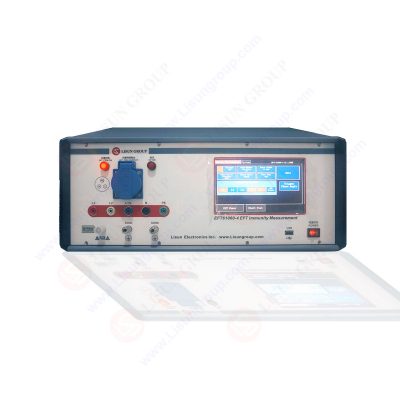

Electromagnetic compatibility (EMC) testing plays a crucial role in ensuring the safety and reliability of electronic devices. The EFT (Electrical Fast Transient) test is a vital component of EMC testing that assesses the immunity of electronic equipment to fast transients and electrical disturbances. This paper focuses on the detailed analysis of EFT testing using the LISUN EFT61000-4 EFT Immunity Measurement system. Key aspects such as the equipment setup, test procedures, technical specifications, and data interpretation are discussed. The study provides a comprehensive understanding of the EFT test and its significance in maintaining the operational integrity of electronic devices.
Introduction
Electromagnetic compatibility (EMC) testing is essential for ensuring that electronic equipment can operate without interference in its intended environment. One of the critical tests in EMC is the EFT (Electrical Fast Transient) test, which is used to evaluate the immunity of equipment against fast transient disturbances. These disturbances are typically caused by switching inductive loads, relay operations, or other similar sources. The EFT test is vital for assessing the robustness of electronic devices and systems in real-world conditions.
The LISUN EFT61000-4 EFT Immunity Measurement system is a state-of-the-art device designed specifically for EFT testing. It conforms to international standards and provides accurate, repeatable results that are essential for product development and compliance verification. This paper delves into the functionality of the LISUN EFT61000-4, highlighting its specifications, testing procedures, and practical applications in the field of EMC testing.
Equipment Overview: LISUN EFT61000-4 EFT Immunity Measurement System
The LISUN EFT61000-4 EFT Immunity Measurement system is engineered to perform EFT tests in compliance with IEC/EN 61000-4-4 standards. This equipment is widely used in industries such as automotive, electronics manufacturing, and consumer electronics, where EMC compliance is critical. Key features of the LISUN EFT61000-4 include:
• Pulse Voltage Range: The equipment supports a wide range of pulse voltages, typically from 100V to 4.5kV, making it suitable for testing a variety of devices.
• Repetition Frequency: The system allows adjustment of pulse repetition frequencies from 1kHz to 100kHz, providing flexibility in simulating real-world transient conditions.
• Burst Duration: Adjustable burst durations enable detailed analysis of the equipment’s response to transients.
• Coupling/Decoupling Network (CDN): The built-in CDN allows for efficient coupling of test pulses onto power lines, minimizing signal distortion and enhancing test accuracy.
EFT61000-4_EFT Immunity Measurement
Below is a table summarizing the key specifications of the LISUN EFT61000-4:
Parameter
Specification
Pulse Voltage Range
100V – 4.5kV
Pulse Repetition Rate
1kHz – 100kHz
Burst Duration
0.75ms – 300ms
Output Impedance
50Ω
Rise Time
5ns ± 30%
Polarity
Positive/Negative
Coupling Modes
Direct, Line to Line, Line to Ground
Standard Compliance
IEC/EN 61000-4-4
EFT Test Procedure
The EFT test procedure using the LISUN EFT61000-4 system involves several steps to ensure accurate and repeatable results:
• Test Setup: The equipment under test (EUT) is placed on a non-conductive surface, and connections are made as per the testing standard. The LISUN EFT61000-4 is connected to the EUT via the built-in CDN.
• Parameter Configuration: Test parameters such as pulse voltage, repetition rate, burst duration, and coupling mode are configured based on the specific test requirements. These parameters are critical for simulating the desired transient conditions.
• Test Execution: The test is initiated, and the EFT pulses are injected into the EUT. The equipment monitors the EUT’s response to the transients, including any functional disturbances or failures.
• Data Collection and Analysis: Data is collected during the test, including information on the EUT’s performance under transient conditions. Analysis of the data helps identify the susceptibility of the EUT to EFT disturbances.
• Reporting: A detailed report is generated, documenting the test conditions, results, and any observed anomalies. This report is essential for compliance documentation and product improvement.
Test Results and Analysis
A typical EFT test result will include the EUT’s response to various levels of transient disturbances. The LISUN EFT61000-4 allows for precise control of test parameters, enabling a thorough evaluation of the EUT’s immunity. Below is a sample data table from a test conducted on an industrial control unit:
Test Condition Pulse Voltage (kV) Repetition Rate (kHz) Burst Duration (ms) EUT Response
Test Condition
Pulse Voltage (kV)
Repetition Rate (kHz)
Burst Duration (ms)
EUT Response
Condition 1
0.5
5
15
No disturbance
Condition 2
1
5
15
Minor functional glitch
Condition 3
1.5
10
30
System reset observed
Condition 4
2
50
75
Intermittent shutdown
Condition 5
3
100
150
Complete system failure
From the data, it can be observed that as the pulse voltage and repetition rate increase, the susceptibility of the EUT also increases. Condition 5 represents the critical failure point, indicating the maximum transient level the device can withstand without complete malfunction.
Importance of EFT Testing
EFT testing is essential for identifying vulnerabilities in electronic systems, especially those operating in environments prone to electrical disturbances. The results from EFT tests guide engineers in designing more robust systems by improving shielding, grounding, and filtering techniques. Compliance with EFT standards is not only a regulatory requirement but also a crucial factor in product reliability and customer satisfaction.
Conclusion
The EFT test, facilitated by advanced systems like the LISUN EFT61000-4 EFT Immunity Measurement, is a vital aspect of EMC testing. It ensures that electronic devices can endure the fast transients they may encounter during their operation. This paper provides a detailed look into the EFT test procedures, highlighting the capabilities of the LISUN EFT61000-4 in performing precise and reliable assessments.
Through careful configuration of test parameters and analysis of results, the EFT test helps manufacturers improve product designs, ensuring that they meet EMC standards and perform reliably in real-world conditions. As technology continues to evolve, the importance of rigorous EFT testing will only grow, reinforcing its role in the development of safe and dependable electronic equipment. https://www.lisungroup.com/news/technology-news/analysis-of-eft-test-for-electromagnetic-compatibility-using-lisun-eft61000-4-eft-immunity-measurement-system.html
.jpg)
Comments
Post a Comment